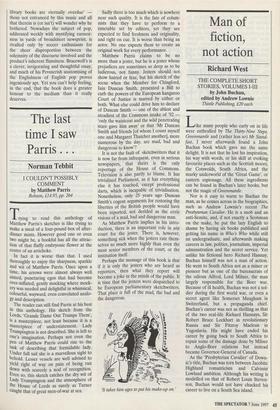The last time I saw Parris. . .
Norman Tebbit
I COULDN'T POSSIBLY COMMENT by Matthew Parris Robson, £14.95, pp. 264 Tying to read this anthology of Matthew Parris's sketches is like trying to make a meal of a four-pound box of after- dinner mints. However good one or even two might be, a boolcful has all the attrac- tion of that fluffy embryonic flower at the centre of an artichoke.
In fact it is worse than that. I used thoroughly to enjoy the sharpness, sparkle and wit of Matthew Parris. Once upon a time, his arrows were almost always well aimed, puncturing egos that had become over-inflated, gently mocking where mock- ery was needed and delightful in whimsical, colourful, wayward, even convoluted analo- gy and description. The reader can still find Parris at his best in this anthology. His sketch from the Lords, 'Grande Dame Out Trumps Them', is a masterpiece, not least because it is a masterpiece of understatement. Lady Trumpington is not described. She is left to one's imagination. Perhaps not even the Pen of Matthew Parris could rise to the task of describing that formidable lady. Under full sail she is a marvellous sight to behold. Lesser vessels are well advised to Yield right of way on pain of being run down with scarcely a nod of recognition. Even so, this sketch catches the dry wit of Lady Trumpington and the atmosphere of the House of Lords as surely as Turner caught that of great men-of-war at sea. Sadly there is too much which is nowhere near such quality. It is the fate of colum- nists that they have to perform to a timetable set by editors, yet they are expected to find freshness and originality, and right on cue. It is worse than being an actor. No one expects them to create an original work for every performance.
Matthew Parris claims to be no more than a jester, but he is a jester whose prejudices are sometimes so deep as to be ludicrous, not funny. Jesters should not show hatred or fear, but his sketch of the scene when the Member for Chingford, lain Duncan Smith, presented a Bill to curb the powers of the European kangaroo Court of Justice is marred by either or both. What else could drive him to declare of Duncan Smith — one of the ablest and steadiest of the Commons intake of '92 — 'only the waistcoat and the wild penetrating stare gave him away' or that 'Mr Duncan Smith and friends [of whom I count myself one and Margaret Thatcher another], more numerous by the day, are mad, bad and dangerous to know'? It is not the fault of sketchwriters that it is now far from infrequent, even in serious newspapers, that theirs is the only reportage of the House of Commons. Television is also partly to blame. It has trivialised Parliament, as it has everything else it has touched, except professional darts, which is incapable of trivialisation. Nonetheless, only 25 years ago Duncan Smith's cogent arguments for restoring the liberties of the British people would have been reported, not derided as the eerie visions of a mad, bad and dangerous man.
As Matthew Parris implies in his intro- duction, there is an important role in any court for the jester. There is, however, something sick when the jesters rate them- selves so much more highly than even the most senior members of the court, or the institution itself.
Perhaps the message of this book is that if it is only the jesters who are heard as reporters, then what they report will become a joke in the minds of the public. It is time that the jesters were despatched to be European parliamentary sketchwriters. That place is full of the mad, the bad and the dangerous.










































































 Previous page
Previous page